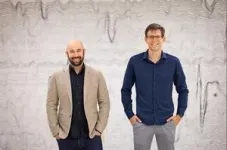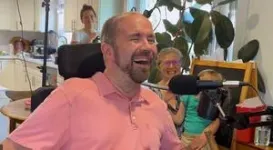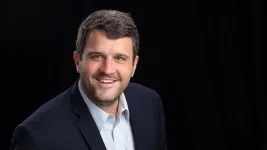(Press-News.org) A new brain-computer interface (BCI) developed at UC Davis Health translates brain signals into speech with up to 97% accuracy — the most accurate system of its kind.
The researchers implanted sensors in the brain of a man with severely impaired speech due to amyotrophic lateral sclerosis (ALS). The man was able to communicate his intended speech within minutes of activating the system.
A study about this work was published today in the New England Journal of Medicine.
ALS, also known as Lou Gehrig's disease, affects the nerve cells that control movement throughout the body. The disease leads to a gradual loss of the ability to stand, walk and use one’s hands. It can also cause a person to lose control of the muscles used to speak, leading to a loss of understandable speech.
The new technology is being developed to restore communication for people who can’t speak due to paralysis or neurological conditions like ALS. It can interpret brain signals when the user tries to speak and turns them into text that is ‘spoken’ aloud by the computer.
“Our BCI technology helped a man with paralysis to communicate with friends, families and caregivers,” said UC Davis neurosurgeon David Brandman. “Our paper demonstrates the most accurate speech neuroprosthesis (device) ever reported.”
Brandman is the co-principal investigator and co-senior author of this study. He is an assistant professor in the UC Davis Department of Neurological Surgery and co-director of the UC Davis Neuroprosthetics Lab.
The new BCI breaks the communication barrier
When someone tries to speak, the new BCI device transforms their brain activity into text on a computer screen. The computer can then read the text out loud.
To develop the system, the team enrolled Casey Harrell, a 45-year-old man with ALS, in the BrainGate clinical trial. At the time of his enrollment, Harrell had weakness in his arms and legs (tetraparesis). His speech was very hard to understand (dysarthria) and required others to help interpret for him.
In July 2023, Brandman implanted the investigational BCI device. He placed four microelectrode arrays into the left precentral gyrus, a brain region responsible for coordinating speech. The arrays are designed to record the brain activity from 256 cortical electrodes.
“We’re really detecting their attempt to move their muscles and talk,” explained neuroscientist Sergey Stavisky. Stavisky is an assistant professor in the Department of Neurological Surgery. He is the co-director of the UC Davis Neuroprosthetics Lab and co-principal investigator of the study. “We are recording from the part of the brain that’s trying to send these commands to the muscles. And we are basically listening into that, and we’re translating those patterns of brain activity into a phoneme — like a syllable or the unit of speech — and then the words they’re trying to say.”
Faster training, better results
Despite recent advances in BCI technology, efforts to enable communication have been slow and prone to errors. This is because the machine-learning programs that interpreted brain signals required a large amount of time and data to perform.
“Previous speech BCI systems had frequent word errors. This made it difficult for the user to be understood consistently and was a barrier to communication,” Brandman explained. “Our objective was to develop a system that empowered someone to be understood whenever they wanted to speak.”
Harrell used the system in both prompted and spontaneous conversational settings. In both cases, speech decoding happened in real time, with continuous system updates to keep it working accurately.
The decoded words were shown on a screen. Amazingly, they were read aloud in a voice that sounded like Harrell’s before he had ALS. The voice was composed using software trained with existing audio samples of his pre-ALS voice.
At the first speech data training session, the system took 30 minutes to achieve 99.6% word accuracy with a 50-word vocabulary.
“The first time we tried the system, he cried with joy as the words he was trying to say correctly appeared on-screen. We all did,” Stavisky said.
In the second session, the size of the potential vocabulary increased to 125,000 words. With just an additional 1.4 hours of training data, the BCI achieved a 90.2% word accuracy with this greatly expanded vocabulary. After continued data collection, the BCI has maintained 97.5% accuracy.
“At this point, we can decode what Casey is trying to say correctly about 97% of the time, which is better than many commercially available smartphone applications that try to interpret a person’s voice,” Brandman said. “This technology is transformative because it provides hope for people who want to speak but can’t. I hope that technology like this speech BCI will help future patients speak with their family and friends.”
The study reports on 84 data collection sessions over 32 weeks. In total, Harrell used the speech BCI in self-paced conversations for over 248 hours to communicate in person and over video chat.
“Not being able to communicate is so frustrating and demoralizing. It is like you are trapped,” Harrell said. “Something like this technology will help people back into life and society.”
“It has been immensely rewarding to see Casey regain his ability to speak with his family and friends through this technology,” said the study’s lead author, Nicholas Card. Card is a postdoctoral scholar in the UC Davis Department of Neurological Surgery.
“Casey and our other BrainGate participants are truly extraordinary. They deserve tremendous credit for joining these early clinical trials. They do this not because they’re hoping to gain any personal benefit, but to help us develop a system that will restore communication and mobility for other people with paralysis,” said co-author and BrainGate trial sponsor-investigator Leigh Hochberg. Hochberg is a neurologist and neuroscientist at Massachusetts General Hospital, Brown University and the VA Providence Healthcare System.
Brandman is the site-responsible principal investigator of the BrainGate2 clinical trial. The trial is enrolling participants. To learn more about the study, visit braingate.org or contact braingate@ucdavis.edu.
A complete list of coauthors and funders is available in the article.
Caution: Investigational device. Limited by Federal law to investigational use.
END
New brain-computer interface allows man with ALS to ‘speak’ again
Technology developed by UC Davis Health restores interpersonal communication
2024-08-14
ELSE PRESS RELEASES FROM THIS DATE:
International study detects consciousness in unresponsive patients
2024-08-14
New research co-led by experts at Mass General Brigham found that brain scans can detect consciousness in some patients with brain injury who are unresponsive.
In the study, 241 participants with severe brain injury who do not respond when given a simple instruction were assessed with functional MRI (fMRI), electroencephalography (EEG), or both tests. During these tests, participants heard instructions, such as “imagine opening and closing your hand” followed, 15-30 seconds later by “stop imagining opening and closing your hand.” The fMRI and EEG brain ...
Manard chosen for Society of Applied Spectroscopy’s Lester W. Strock Award
2024-08-14
Benjamin Manard, an analytical chemist in the Chemical Sciences Division of the Department of Energy’s Oak Ridge National Laboratory, will receive the 2024 Lester W. Strock Award from the Society of Applied Spectroscopy.
The prize is named for the late Lester W. Strock, a crystal chemist and pioneer in applied spectroscopy. The annual award recognizes researchers who produce outstanding publications in analytical atomic spectrochemistry.
“Manard’s publications over the last five years demonstrate a clear focus on the elemental and isotopic analysis of nuclear materials using a variety ...
Patients with unexplainable chronic itch have unique blood biomarkers that could eventually lead to new targeted treatments
2024-08-14
Millions of patients worldwide suffer from a chronic itching condition with no identifiable cause – a condition known as chronic pruritus of unknown origin (CPUO) – that has no targeted therapies approved to treat it. Many of these patients suffer for years with little relief, but a new University of Maryland School of Medicine study may provide hope for future treatments. Patients were found to have lower than normal levels of metabolite biomarkers in the blood plasma that could point to a cause of their excruciating symptoms.
Findings were recently published in the journal Scientific Reports.
“Our study found a distinct deficit in certain metabolite ...
Unveiling the brain's reward circuitry
2024-08-14
PHILADELPHIA (August 14, 2024) – A research team – co-led by Penn Nursing – has made a significant breakthrough in understanding the complex neural circuitry underlying reward and addiction by identifying 34 distinct subtypes of medium spiny neurons (MSNs) in the nucleus accumbens (NAc), a key brain region involved in pleasure and motivation. The findings, published in the journal Scientific Reports by Nature, offer insights into the diversity of these neurons and their potential roles in substance ...
Do people with high blood pressure have a higher risk of Alzheimer’s disease?
2024-08-14
EMBARGOED FOR RELEASE UNTIL 4 P.M. ET, WEDNESDAY, AUGUST 14, 2024
MINNEAPOLIS – People 60 and older with untreated high blood pressure may have an increased risk of Alzheimer’s disease compared to both people who have been or are being treated for high blood pressure as well as people without the chronic condition. The new research, a meta-analysis, is published in the August 14, 2024, online issue of Neurology®, the medical journal of the American Academy of Neurology. These results do not prove that untreated high blood pressure causes Alzheimer’s disease, they only show ...
Good news for people with MS—COVID-19 vaccine not tied to relapse
2024-08-14
EMBARGOED FOR RELEASE UNTIL 4 P.M. ET, WEDNESDAY, AUGUST 14, 2024
MINNEAPOLIS – People with multiple sclerosis (MS) have an increased risk of severe coronavirus infection, but there has been concern regarding potential relapse after vaccination. A new study finds that people with MS may not have a higher risk of relapse after COVID-19 vaccination. The study is published in the August 14, 2024, online issue of Neurology®, the medical journal of the American Academy of Neurology.
“People with MS have an increased risk of severe ...
The Lundquist Institute WIC Program receives USDA 2024 WIC Breastfeeding Gold Award of Excellence
2024-08-14
The Lundquist Institute for Biomedical Innovation at Harbor-UCLA Medical Center (TLI) is pleased to announce that its WIC Program has received the U.S. Department of Agriculture’s Food and Nutrition Service (FNS) 2024 WIC Breastfeeding Gold Award of Excellence. The FNS notes that the “intent is to provide models and motivate other local agencies to strengthen their breastfeeding promotion and support activities and ultimately increase breastfeeding initiation and duration rates among WIC participants.” The FNS award letter recognizes the TLI WIC Program “for its exemplary efforts in WIC breastfeeding promotion and ...
First participant enrolled in NIH-Funded Access for All in ALS Consortium
2024-08-14
The Access for All in ALS Consortium (ALL ALS) announced the successful enrollment of the first participant.
Established in the autumn of 2023 with funding from the National Institutes of Health (NIH), ALL ALS is a multi-institutional effort, and aims to disrupt the ALS clinical research landscape using open science methods to build broadly accessible resources to advance ALS research. The consortium brings together research scientists from across the country, combining their efforts to collect clinical and biomarker data from people with ALS symptoms, asymptomatic individuals at risk of developing inherited forms of ALS, and control participants. The ALL ALS ...
Department of Energy Office of Science accepting applications, offering workshops for Office of Science Graduate Student Research (SCGSR) awards
2024-08-14
Washington, D.C. - Current U.S. Ph.D. students in qualified graduate programs at accredited U.S. academic institutions who are conducting their graduate thesis research in targeted areas of importance to the DOE Office of Science are invited to apply for the Office of Science Graduate Student Research (SCGSR) program.
Helpful application assistance workshops will be held on Thursday, September 12, 2024, 2:00 PM – 3:30 PM EDT and Thursday, October 10, 2024, 2:00 PM – 4:30 PM EDT.
Applications are due at 5:00 pm Eastern Daylight Time (EDT) on November 6, 2024.
The September 12, ...
Brian Peters part of multi-disciplinary team awarded $3.9 million to study mixed fungal-bacterial infections
2024-08-14
Brian Peters, PhD, First Tennessee Endowed Chair of Excellence in Clinical Pharmacy and professor in the Department of Clinical Pharmacy and Translational Science at the UT Health Science Center, was recently awarded $3.9 million from the National Institute of Allergy and Infectious Diseases for a project aimed at unravelling intricate mysteries surrounding complex fungal-bacterial infections. James Cassat, MD, PhD, Vanderbilt University Medical Center, and Paul Fidel, PhD, LSU Health New Orleans, are also principal investigators.
Infections caused by both fungi ...
LAST 30 PRESS RELEASES:
Children born with upper limb difference show the incredible adaptability of the young brain
How bacteria can reclaim lost energy, nutrients, and clean water from wastewater
Fast-paced lives demand faster vision: ecology shapes how “quickly” animals see time
Global warming and heat stress risk close in on the Tour de France
New technology reveals hidden DNA scaffolding built before life ‘switches on’
New study reveals early healthy eating shapes lifelong brain health
Trashing cancer’s ‘undruggable’ proteins
Industrial research labs were invented in Europe but made the U.S. a tech superpower
Enzymes work as Maxwell's demon by using memory stored as motion
Methane’s missing emissions: The underestimated impact of small sources
Beating cancer by eating cancer
How sleep disruption impairs social memory: Oxytocin circuits reveal mechanisms and therapeutic opportunities
Natural compound from pomegranate leaves disrupts disease-causing amyloid
A depression treatment that once took eight weeks may work just as well in one
New study calls for personalized, tiered approach to postpartum care
The hidden breath of cities: Why we need to look closer at public fountains
Rewetting peatlands could unlock more effective carbon removal using biochar
Microplastics discovered in prostate tumors
ACES marks 150 years of the Morrow Plots, our nation's oldest research field
Physicists open door to future, hyper-efficient ‘orbitronic’ devices
$80 million supports research into exceptional longevity
Why the planet doesn’t dry out together: scientists solve a global climate puzzle
Global greening: The Earth’s green wave is shifting
You don't need to be very altruistic to stop an epidemic
Signs on Stone Age objects: Precursor to written language dates back 40,000 years
MIT study reveals climatic fingerprints of wildfires and volcanic eruptions
A shift from the sandlot to the travel team for youth sports
Hair-width LEDs could replace lasers
The hidden infections that refuse to go away: how household practices can stop deadly diseases
Ochsner MD Anderson uses groundbreaking TIL therapy to treat advanced melanoma in adults
[Press-News.org] New brain-computer interface allows man with ALS to ‘speak’ againTechnology developed by UC Davis Health restores interpersonal communication






